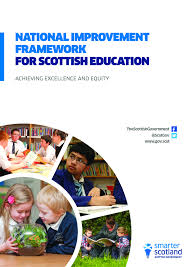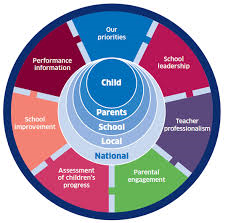The National Improvement Framework was published by the Scottish Government in January 2016. From the outset, excellence and equity are placed at the heart of the document:
‘We are committed to a Scotland in which all children and young people can realise their potential, regardless of their social background or learning needs, thereby developing the knowledge, skills and attributes they will need to flourish in life, learning and work.’ (page 2)
The overarching vision of the NIF is:
• excellence through raising attainment, with a particular focus on every child achieving the highest standards in literacy and numeracy
• achieving equity, ensuring every child, no matter their background, has the same opportunity to succeed
The NIF emphasises that it builds on previous improvements and reforms, including Curriculum for Excellence, GIRFEC, the Early Years Collaborative and Teaching Scotland’s Future. It also highlights the positive findings of Improving Schools in Scotland: An OECD Perspective, which recognises Scotland’s strong position to compete with the best education systems in the world. However, a key recommendation of the OECD is also brought to the fore: the need to develop an integrated framework for assessment and evaluation that encompasses all system levels and ensures all partners are focused effectively on key priorities.
‘This Framework has the potential to provide a robust evidence base in ways that enhance rather than detract from the breadth and depth of the Curriculum for Excellence.’ (Improving Schools in Scotland: An OECD Perspective)
Perhaps one of the most pivotal statements in the document is ‘the new framework is for the benefit of Scotland’s children’ (page 5), and this message is reinforced throughout, including on the diagram illustrating the key drivers of improvement.
There are currently four priorities for the NIF:
• Improvement in attainment , particularly in numeracy and literacy;
• Closing the attainment gap between the most and least disadvantaged children;
• Improvement in children and young people’s health and wellbeing; and
• Improvement in employability skills and sustained, positive school leaver destinations for all young people
The new Framework will provide robust, consistent and transparent data across Scotland:
• Data on achievement of CfE levels for pupils at the end of P1, P4 and P7 will be collected at local and national level. This data will be based on teacher judgement, informed by nationally consistent standardised assessments on aspects of literacy and numeracy. Standardised assessments will be piloted in 2016 and available for use across all schools in 2017.
• Schools will receive training on how to interpret the results of standardised assessments and how results connect to and inform other sources of assessment evidence.
• In parallel to the development of standardised assessments, the importance of schools maintaining a broad approach to assessment will also be reinforced (e.g. agreeing on standards, engaging in moderation)
• Parents will be able to access information from teacher’s professional judgement and the underlying standardised assessment data about their child’s learning.
The National Improvement Framework identifies six key drivers of improvement:
School Leadership: Head Teachers and teachers who are empowered, and who empower others to take ownership of their own learning, can ensure the highest quality of learning and teaching and, in turn, allow all children to reach their full potential.
Teacher Professionalism: there is a strong link between teacher’s professional skills and competences, the quality of children’s learning experiences and the outcomes that they achieve.
Parental Engagement: parental and family engagement is a key factor in helping all children achieve the highest standards whilst reducing inequity and closing the attainment gap.
Assessment of children’s progress: we need to know the size of the attainment gap at different ages and stages across Scotland, and whether this is narrowing over time, in order to take the right action to close it. Robust, consistent evidence (including teacher judgement, ongoing classwork and standardised assessments) is vital.
School improvement: all children should experience the very best education, delivered by self-improving, empowered schools, along with key partners such as community learning and development professionals. Evaluating learning, teaching and assessment, the quality of what goes on in classrooms, children’s broader learning experiences and data on attendance and exclusions will tell us how good the experience is for children, as we strive towards excellence for all.
Performance information: there is no specific measure that will provide a picture of performance. A balanced range of measures, including analysis of data from each of the other drivers, are required to evaluate Scottish education and take action to improve further.
The NIF summarises the types of evidence which will be gathered around each of the key drivers and what information this evidence will provide. The document also outlines the purposes and uses of data, providing concise information on how data can impact positively on children, parents/carers, schools and establishments, Community Planning Partnerships, local authorities and at a national level.
The NIF takes time to emphasise that simply having information is not enough to bring about improvement. Rather, it is how information is interpreted, used and acted upon that will ensure change and success; evidence-based approaches must be embedded. Stakeholders at all levels – children and young people, parents and families, teachers, schools and partners, local government, Education Scotland and Scottish Government – can benefit and learn from good quality, relevant information and act upon this to bring about improvement and success.
The NIF concludes by stating that the full implementation of the NIF will be phased in over time and reviewed on an annual basis. Next steps are also outlined, including:
• Schools will receive advice and guidance on achievement of a CfE level in literacy and numeracy in 2016.
• New standardised assessments will be developed and piloted in 2016 and introduced nationally in 2017.
• There will be a legal requirement for School Improvement Plans and School Improvement Reports to be explicitly linked to the NIF in 2017.
• Local authorities will be required to produce annual plans and reports linked to the NIF in 2017.
• Consultation on the above statutory requirements will take place in summer 2016.
Click on the link to download more information:

